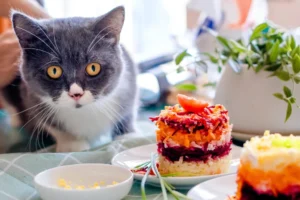Cats are beloved pets for many people, but dealing with feline diarrhea is one aspect of their care that can be challenging. Understanding why cats get diarrhea often can help pet owners provide the best care for their furry friends.
Cats can experience diarrhea for a variety of reasons, including dietary indiscretions, food allergies, infections, or underlying health conditions. Identifying the cause of your cat’s diarrhea is crucial in determining the appropriate treatment and management strategies. Here is a detailed outline to help you navigate this issue and support your cat’s health and well-being.
Importance of Hydration
Ensuring your cat stays hydrated is crucial when they are experiencing diarrhea. Just like with us humans, diarrhea can quickly lead to dehydration in cats, which can have serious consequences. Dehydration can make your furry friend feel even more miserable and prolong their recovery time. Make sure to provide fresh water for your cat at all times and consider offering electrolyte solutions recommended by your vet to help replenish lost fluids and minerals.
Common Causes of Diarrhea in Cats
Diarrhea in cats can be caused by a variety of factors, so it’s important to keep an eye out for potential triggers. Dietary changes are a common culprit, whether it’s a new brand of food or sneaking a taste of something they shouldn’t have. Infections, parasites, and stress can also lead to diarrhea in cats. If you notice your cat experiencing diarrhea, try to trace back any recent changes or stressors that may be causing it. Consulting with your vet can help identify the root cause and determine the best course of action to help your cat feel better.
And remember, always consult with your veterinarian if your cat is experiencing frequent or severe diarrhea to rule out any underlying health issues that may require medical treatment. Early intervention can help prevent dehydration and ensure your furry friend gets back on their feet in no time.
Dietary Considerations
Cats can experience diarrhea often due to dietary issues. Low-quality food or sudden changes in diet can upset their stomachs. To prevent this, it’s crucial to provide high-quality, easily digestible food. Look for options that are balanced and gentle on sensitive stomachs. Additionally, ensure your cat has access to fresh water at all times to stay hydrated and maintain digestive health.
Unique Insight: Probiotics can be beneficial in promoting healthy gut flora in cats and reducing the occurrence of diarrhea. Consider adding probiotic supplements to your cat’s diet after consulting with your veterinarian.
Veterinary Evaluation
If your cat is experiencing persistent or severe diarrhea, it’s essential to seek professional veterinary advice. Underlying health issues could be causing the problem and may require medical intervention. Don’t hesitate to contact your vet if your cat’s symptoms worsen or don’t improve with home care measures. Remember, your veterinarian is the best person to diagnose and treat your cat’s health concerns effectively.
For more information on managing and preventing diarrhea in cats, consult this informative resource from the American Association of Feline Practitioners: Understanding Feline Diarrhea.
Home Care Tips
Cats can develop diarrhea for various reasons, such as dietary issues, stress, or underlying health conditions. When your fluffy friend is experiencing this unpleasant situation, there are some home care tips you can follow to help them feel better.
Firstly, monitor your cat’s condition closely. Keep an eye on the frequency and consistency of their bowel movements. If the diarrhea persists for more than a day or is accompanied by other concerning symptoms like lethargy or vomiting, it’s essential to consult your veterinarian promptly.
Adjusting your cat’s diet can also aid in managing diarrhea. Consider feeding them a bland diet consisting of boiled chicken or rice to help soothe their upset stomach. Ensure they have access to fresh water at all times to prevent dehydration.
Creating a comfortable environment for your cat to recover is crucial. Provide a quiet and cozy space where they can rest undisturbed. Minimize stress factors in their surroundings, as anxiety can exacerbate digestive issues.
By attentively caring for your cat at home, you can help alleviate their discomfort and support their recovery from diarrhea. Remember that seeking professional advice from a vet is always advisable for persistent or severe cases.
Probiotics for Cats
Did you know that probiotics can play a significant role in maintaining your cat’s gut health and managing diarrhea? These beneficial bacteria can aid in restoring the balance of your cat’s intestinal flora, promoting better digestion and overall well-being.
When choosing probiotics for your cat, opt for formulations specifically designed for feline use. Look for probiotic supplements that contain strains like Lactobacillus and Bifidobacterium, known for their gut health benefits in cats.
Introducing probiotics to your cat’s daily routine can be as simple as mixing the supplement with their food or administering it directly into their mouth. Additionally, probiotic-rich foods like yogurt or kefir can serve as natural sources of beneficial bacteria for your furry friend.
Regularly incorporating probiotics into your cat’s diet can help prevent diarrhea episodes and maintain a healthy digestive system. Consult your vet for guidance on the appropriate probiotic regimen tailored to your cat’s specific needs.
Key Insight: Probiotics offer a natural and effective way to support your cat’s gut health, potentially reducing the frequency of diarrhea episodes and promoting overall wellness.
Remember, always consult with your veterinarian before introducing any new supplements or dietary changes to your cat’s routine.
Why Do Cats Get Diarrhea Often?
Cats can experience frequent diarrhea due to various reasons such as diet changes, stress, infections, or underlying health issues like parasites or inflammatory bowel disease. It’s crucial to identify the root cause to address this issue effectively and ensure your feline friend’s well-being.
Prevention Strategies
To prevent diarrhea in cats, maintain a consistent feeding schedule to avoid sudden dietary changes that might upset their stomach. Minimize stress by creating a safe and peaceful environment for your cat. Address any underlying health concerns promptly by seeking veterinary care if you notice abnormal symptoms. Additionally, ensure your cat has access to fresh water at all times to stay hydrated and support digestive health.
Fun Feline Facts:
– Cats have a unique grooming behavior called “allogrooming,” where they groom each other as a form of social bonding.
– A group of cats is called a “clowder,” and a litter of kittens is known as a “kindle.”
Remember, a healthy and happy cat is a joy to have around, so take proactive steps to prevent diarrhea and keep your feline companion thriving.
Why do Cats Get Diarrhea Often?
Cats can be finicky creatures, and their digestive systems are no exception. Several reasons can contribute to your feline friend experiencing diarrhea more frequently than you’d like. One common culprit is a sudden change in diet. Cats are creatures of habit, and switching their food abruptly can upset their delicate stomachs, leading to loose stools.
Another factor to consider is parasites. Worms and other intestinal bugs can wreak havoc on your cat’s digestive system, causing diarrhea and other unpleasant symptoms. It’s essential to keep up with regular vet visits and preventative treatments to keep these pesky critters at bay.
Stress is also a significant player in your cat’s digestive health. Just like humans, cats can experience stress from changes in their environment, routine, or even their family dynamics. This stress can manifest in various ways, including diarrhea. Providing a safe and consistent environment for your cat can help alleviate some of this stress and improve their overall well-being.
Conclusion
When it comes to caring for your cat’s digestive health, it’s essential to pay attention to their diet, stress levels, and overall well-being. By keeping your feline friend on a consistent diet, free from sudden changes, and ensuring they have a safe and stress-free environment, you can help reduce the likelihood of diarrhea episodes. Regular vet check-ups and preventative measures against parasites are also crucial for maintaining your cat’s digestive health. Remember, a happy cat is a healthy cat!
Alex, a passionate animal lover, has experience in training and understanding animal behavior. As a proud pet parent to two dogs and three cats, he founded AnimalReport.net to share insights from animal experts and expand his knowledge of the animal kingdom.




